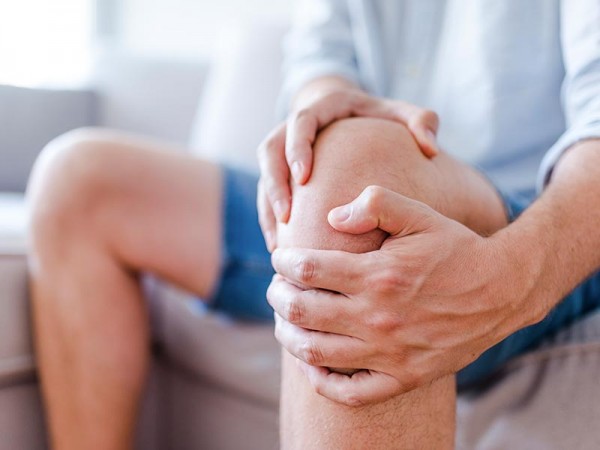Our joints perform hard work for a lifetime. They carry our weight through everyday life. They run, they jump and they climb stairs with us. Then again, they remain stiff at the desk for hours. A demanding contrast program. If you want to prevent joint problems, it is best to rely on moderate, continuous exercise and our other useful tips.
The knee, the hand, the hip – and the wear and tear
There are 100 joints in the body. The largest joint in our body is the knee, the most flexible joints are our shoulders. Already from the age of 30 our joints begin to wear out - at first completely unnoticed. With increasing age, many people suffer from joint problems. The joints feel a little immobile, they are stiffer than usual and a little "rusty". Often they even hurt. Especially often we feel the wear and tear in the joints that we often and heavily strain, such as knees, hips, shoulders, hands and feet.
What causes pain in the joints?
A joint consists of two bones that move against each other. To prevent them rubbing directly against each other, a thin layer of cartilage (with various building blocks such as glucosamine sulphate, collagen, chondroitin sulphate, hyaluronic acid) and synovial fluid lubricates the two bones of the joint.
However, the synovial fluid is not automatically flushed around the joint. Only through movement is it actively incorporated.
This is why it is so important that you move regularly and in a joint-friendly way. However, if you are already suffering from pain and have stiff joints, you often tend to spare the joint. But that only makes things worse. The cartilage is less well supplied with blood and slowly recedes.
What to do about joint problems
1. If you rest, you rust
Sitting for long periods puts a strain on the joints. We sit around almost half the day - at our desk, on the couch or in the car. Interrupt long periods of sitting as often as possible. Get up in between, walk a bit, stretch yourself extensively and stretch your muscles in all directions.
2. Avoid one-sided movements
One-sided distributed stress at work or during sports damages the joints. Leg malpositions such as knock-knees and bow legs can also promote joint complaints.
3. Go through life more easily
Overweight literally puts a strain on the joints. The more body weight presses on knees, hips and spine, the faster the joints wear out.
4. Regular, gentle sport
In order to stay fit and mobile, joint-friendly sports with a moderate intensity of stress and an easily controlled range of motion are ideal: such as swimming, hiking, walking and cycling. If you strengthen the muscles around the joints with a strength training, you will stabilize the joints in a targeted manner. Also stretch your muscles regularly.
5. Avoid abrupt movements
Sports with uncontrolled movements and heavy stopping are not suitable - such as football, handball or badminton. Do not overload your joints, especially if you already have complaints. Rely on moderate movements. You can also discuss this with your doctor or physiotherapist.
6. Eat fish
Fish is rich in Omega 3 fatty acids and offers the body healthy fat to "lubricate" the joints again.
7. Food supplement for the joints
To support your joints, tendons, ligaments, bones and cartilage, "Joint Vital with Glucosamine + Chondroitin + MSM + Hyaluronic Acid" provides all the important building blocks. "VISPURA Glucosamine + Chondroitin + MSM" supplies you with the VITAL complex of high-quality MSM, chondroitin and glucosamine, supplemented by 100% of the daily requirement of Vitamin C. Vitamin C improves absorption and contributes to normal collagen formation for normal bone and cartilage function.
This might also interest you
-
Magnesium - the vital mineral
Without sufficient magnesium nothing works as it should: Without magnesium the muscles cannot relax. The energy balance is disturbed, you feel tired and exhausted. -
Sore muscles & regeneration - How to get fit again quickly after sport
You have trained hard and really worked out, but the first thing you feel is a really strong sore muscle. Oh dear, have you done everything wrong now? -
The right way to jog: 7 tips for beginners for good results
If you follow these 7 running tips for beginners, you will enjoy jogging for a long time: Because running properly makes you fit, slim and resilient - and it strengthens the immune system.
Picture: istockphoto.com | dragana991











